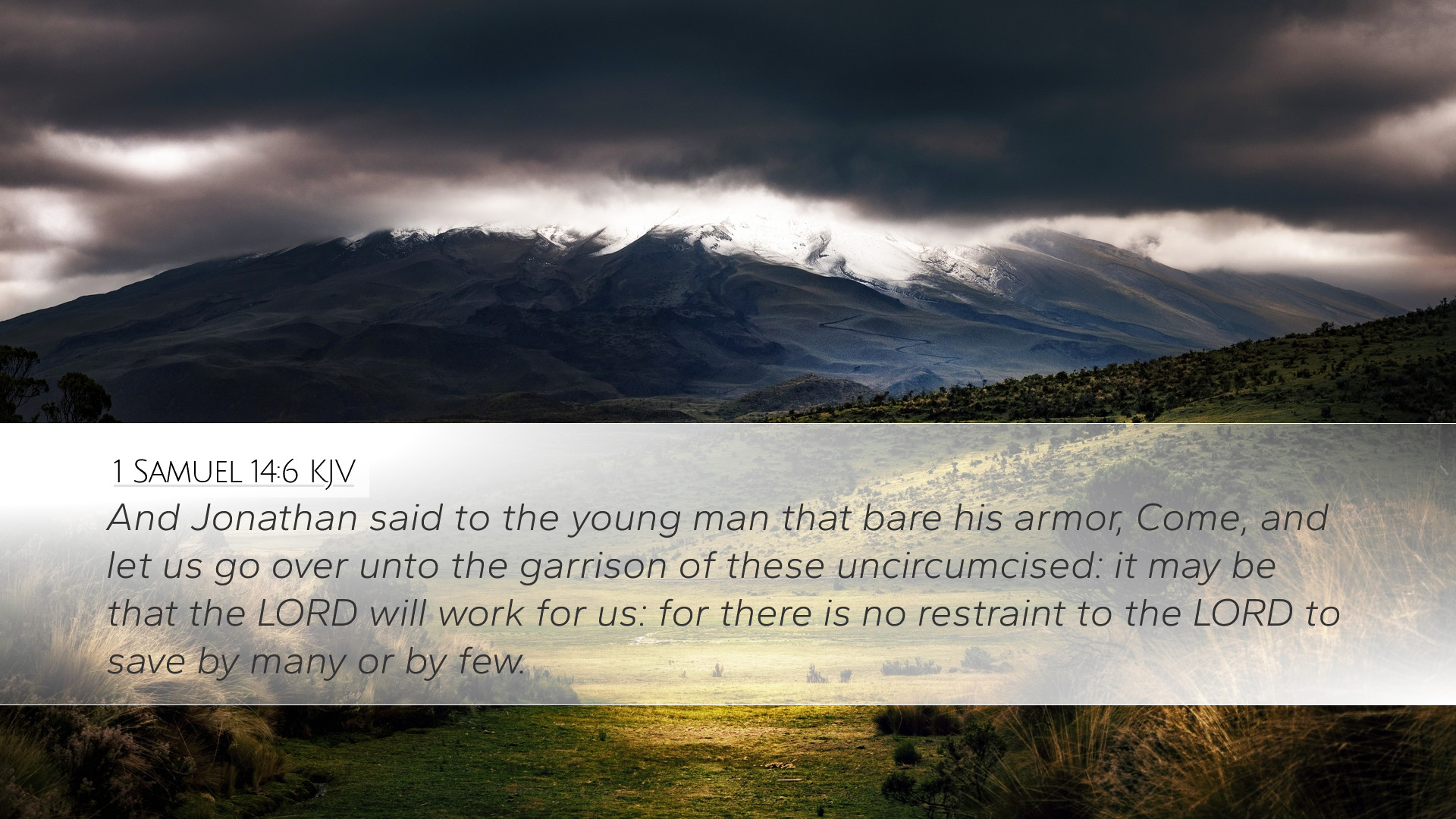Commentary on 1 Samuel 14:6
Verse Context: 1 Samuel 14:6 states, “And Jonathan said to the young man who bore his armor, ‘Come, let us go over to the garrison of these uncircumcised; it may be that the LORD will work for us, for nothing restrains the LORD from saving by many or by few.’” This verse exemplifies a pivotal moment in Israel's history, showcasing Jonathan’s faith and courage contrasted against the despair that had taken hold of Israel under Saul's leadership.
Textual Analysis
1. The Character of Jonathan:
Jonathan is portrayed as a man of great faith and valor. His initiative to confront the Philistine garrison reflects a deep conviction that God is not limited by human circumstances. As noted by Matthew Henry, "He believed that divine assistance could turn the tide of battle, regardless of the numbers involved." This establishes Jonathan as a leader who acts on faith, advocating for trust in God’s capabilities over human limitations.
2. The Armor-Bearer:
Jonathan's armor-bearer represents loyalty and obedience. His willingness to accompany Jonathan demonstrates the importance of supportive relationships in the pursuit of God’s work. Albert Barnes emphasizes this partnership, remarking that "true faith often inspires others to act." The armor-bearer’s silent approval of Jonathan’s bold decision is a testament to the strength of mutual faith among believers.
Faith in Action
3. A Call to Act:
Jonathan's challenge to his armor-bearer is more than a mere rhetorical question; it invites action grounded in faith. Adam Clarke expounds that Jonathan’s words exemplify "a strategic call to take up arms against overwhelming odds." He does not speculate on the outcome but leans entirely on God’s sovereignty. This moment speaks volumes about the nature of faith as it invites believers to venture into uncertain situations, trusting wholly in divine providence.
Theological Implications
4. The Nature of God’s Power:
Jonathan’s assertion that "nothing restrains the LORD from saving by many or by few" conveys profound theological principles regarding God’s omnipotence. It asserts that God's strength is not predicated upon the vastness of human effort. Matthew Henry explains that "God can save with a small number just as easily as with a great multitude." This essential truth serves as a reminder to the Church today that faith is not quantifiable but rooted in God’s authoritative will and purpose.
5. The Uncircumcised Philistines:
Referring to the Philistines as “these uncircumcised” denotes a theological contrast between the covenant people of God and their adversaries. Albert Barnes points out that "the term underscores the distinction between God’s chosen nation and idol worshippers." This recognition imbues the conflict with profound spiritual significance, framing Israel's endeavors as not merely political or military but as integral to God's sovereign plan and covenantal promises.
Application for Today
6. Encouragement for Believers:
In our contemporary context, Jonathan’s boldness serves as a powerful exhortation for believers. Adam Clarke encourages readers to understand that "faith often requires stepping forward into uncertainty." It challenges Christians to recognize that God’s might is available regardless of the size of their congregation or resources. The narrative implores believers to maintain conviction and mobilize even amidst societal pressures that discourage faith-based action.
7. Unity and Collaboration:
The partnership between Jonathan and his armor-bearer highlights the significance of unity in the body of Christ. As identified by Matthew Henry, "the church thrives on cooperation among its members." This cooperative spirit is vital for advancing the Kingdom, reminding pastors and leaders to cultivate environments where perseverance in faith occurs collaboratively.
Conclusion
1 Samuel 14:6 is not merely a historical account; it is a profound declaration of faith in God's omnipotence and an impetus for courageous action rooted in that faith. As highlighted in the combined insights of these esteemed commentaries, Jonathan's faith embodies the principle that God can work through individuals and small groups to achieve great victories. In our own lives and ministries, we are reminded to cultivate a faith that does not shy away from challenges but instead meets them with the assurance that God is with us, regardless of the circumstances we face.


